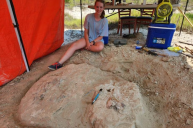While scientists know a lot about many whale species there is one that continues to evade them. The spade-toothed whale is the world's rarest whale and scientists have just stumbled upon one. Or rather, the body of a spade-toothed whale stumbled upon them. Now scientists will be dissecting this whale to learn more about this mystery species.
More About The World's Rarest Whale
Senior marine science advisor for New Zealand's conservation agency, Anton van Helden, gave the world's rarest whale its name. He decided on spade-toothed whale to distinguish this whale from other beaked species. He shared his excitement with the NY Post after the body of the dead whale washed up on a New Zealand beach in July. "I can't tell you how extraordinary it is," he began. "For me personally, it's unbelievable." The experience is unbelievable for Helden because he has been studying beaked whales for 35 years.
Additionally, this whale is the great mystery of the ocean. It is known as the world's rarest whale because none have ever been seen alive. In fact, scientists have no idea where in the ocean these creatures live. For once, the list of what scientists know about this species far outweighs the list of things that they do know. They have no idea what its internal workings look like or how they function, but they are going to find out. Scientists plan on dissecting this whale to learn more about its species.
They already know that all beaked whales have different stomach systems. However, they have no idea how the spade tooth whale's stomach system works or how it processes its food. Additionally, they have never seen the brain of a spade-tooth whale. Furthermore, because their lives are so mysterious the scientists have no idea how this spade-toothed whale died. They plan to find out over the next week as they begin to study and dissect the 16-foot male.
Why Dissecting This Whale Is Important

Getty Images
While this may sound gory or uninteresting to you, scientists dissecting the world's rarest whale is of the utmost importance. Any time we learn about new animals and wildlife on our planet it gives us new information to work with. The better we understand our planet the more easily we can take care of it. Helden shared another point of view that he found exciting. "There may be parasites completely new to science that just live in this whale," he said. While the thought of discovering new parasites definitely does not excite me I am sure these scientists will find value in it.
They also hope to learn how the species produces sound and what it eats, anything to give us an insight into their lives. Although six other spade-tooth whales have been found, this will be the first that is intact and will be properly studied. The Post shares that DNA sequencing in 2002 proves all three whales found in the past where the same species and were different from other beaked whales. However, now they have the perfect specimen. The scientists did see marks from cookiecutter sharks on the whale's body, but they claimed that was normal and not the cause of death.
Another thing that makes this discovery so special is that the scientists will not be dissecting this whale alone. They will be joined by Māori, New Zealand's Indigenous people. Members of local tribes will be present throughout the dissection and will ensure that the whale is treated with the utmost respect as it is seen as a treasure. Hopefully with this incredible group effort scientists will be able to discover not only how the world's rarest whale died but also how it lives and contributes to our ecosystem.




